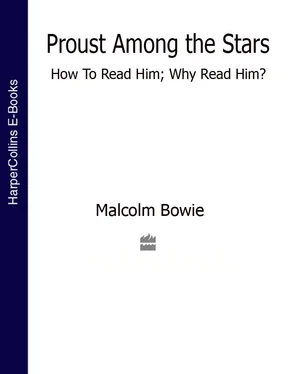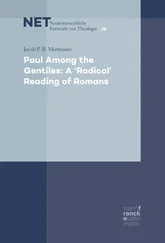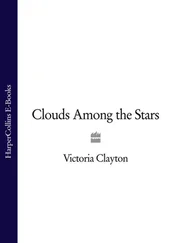A majestic respiratory rhythm is at work in A la recherche du temps perdu. On the one hand, the narrator of the novel has a mania for multiplicity, wants the world to contain more things rather than fewer, and stands guard over an unstoppable transformational machine. He speaks of the hundreds, thousands and millions of opportunities for new perception that the world affords, and of the novelist as an insatiable traveller in outer and inner space, always on the move and always driven by the demon of imagination to actualise the potential forms of things. How wrong I was, and how dishonest, this narrator cries in La Prisonnière , to begin the present volume so schematically and with such a thinned-down sense of what the world has in it: ‘ce n’est pas un univers, c’est des millions, presque autant qu’il existe de prunelles et d’intelligences humaines, qui s’éveillent tous les matins’ (III, 696; ‘it is not one universe, but millions, almost as many as the number of human eyes and brains in existence, that awake every morning’ (V, 212)).
On the other hand, everything is connected to everything else in the remembering or fantasising mind, and the oceanic swell which seems to bear the voyager onwards to ever-new destinations can easily bring him home to his habitual tastes and his over-familiar emotional landmarks. Structure, limitation and fewness have a way of reasserting themselves even as the narrator seeks to be convinced that an indefinite plurality of worlds lies at his feet. In Le Temps retrouvé a new parsimony is discovered on the other side of plenitude. The association of ideas, having taken the narrator on a long excursion, in due course brings him back:
le poète a eu raison de parler des «fils mystérieux» que la vie brise. Mais il est encore plus vrai qu’elle en tisse sans cesse entre les êtres, entre les événements, qu’elle entrecroise ces fils, qu’elle les redouble pour épaissir la trame, si bien qu’entre le moindre point de notre passé et tous les autres un riche réseau de souvenirs ne laisse que le choix des communications.
(IV, 607)
the poet was right when he spoke of the ‘mysterious threads’ which are broken by life. But the truth, even more, is that life is perpetually weaving fresh threads which link one individual and one event to another, and that these threads are crossed and recrossed, doubled and redoubled to thicken the web, so that between any slightest point of our past and all the others a rich network of memories gives us an almost infinite variety of communicating paths to choose from.
(VI, 428)
After the ecstasy of difference without end comes the quiet satisfaction of a connecting and unifying web.
The narrative breathes out, and the world is many. It breathes in again, and the world is one. Look at the book from one angle, and it is overflowing with characters and incidents. Look at it from another angle, and the characters begin to merge, while the incidents in which they figure begin to resemble the after-shocks caused by a very small group of primal events. The narrator of the novel, far from being an impersonal manipulator of this rhythm, is himself caught inside it. At one moment, he is a loose compendium of characteristics. His voice contains many voices. He is a magpie and a mimic. He veers this way and that, and takes the colouring of the company he keeps. At the next moment, he seems to stand above the social flux, to be an individual, a singularity, a legislator, the helmsman of an artistic project that is going somewhere and must be kept on course. Proust’s narrator is both chorus and soloist, a confusion of appetites and a single long-breathed desire.
Yet the sound of breathing that is to be heard in Proust’s book comes not simply from the larger rhythms of its plot or from the periodic concentration and dispersal of the narrator’s sense of selfhood, but from a language that is unique within the French literary tradition for its alternating copiousness and restraint. Proust’s language now takes risks and now plays safe. It is full of lexical curiosities and of residual deposits left by earlier literary works, but also does many ordinary things in plain words. It cultivates elegance, ornament, obliqueness and bel canto and then switches to linguistic rough trade. It speaks of exquisite intimations that can occur only in a half-light and only on the margins of consciousness and then babbles of chamber-pots, leg-irons, aeroplane factories and policemen.
A diction of this kind, especially when it is combined with a literary syntax that seems to offer a working model of speculative thought, has an optimistic underlying message for the reader. Proust’s writing – the fantastication of it, the fine-spun texture of it, the power, pace and percipience of it – is a song of intellectual gladness and an unwearying tribute to the muse of comedy. If there were no stubborn philosophical problems in the world, and no war, famine, disease or torture in it either, all thinking might resemble a gracious and disinterested Proustian paragraph. In the present sorry state of the world we may find ourselves returning to Proust for a new sense of mental largeness and potentiality. From within our dull, platitudinous everyday language, we may go back to Proust, as if to a great poet, to be reminded of the wonders that such language, under pressure, can still perform. Proust’s novel is a three-thousand-page incantation, an insolently protracted exercise in word-magic, a tonic, a restorative for any reader who has gone tired and listless under a late twentieth-century tide of verbal waste-matter. Perhaps Proust really is Europe’s last great writer, as some of his slogan-prone enthusiasts have claimed.
Yet Proust’s novel has another, less encouraging, story in it. Seeking to localise this, we might be tempted to say, in the words of Shakespeare’s Troilus, that the narrator’s ‘desire is boundless but his act a slave to limit’, and there would be evidence for this view. Proust’s protagonist, for all his wishfulness, seems to have limited energy and willpower, and an ailing sense of purpose. In the course of a very long tale told about himself, he does not do much. In society, he is immobilised by the spectacle of other people’s busy posturings. In the inner realm, he sees bright futures ahead of him, but often sinks back into an anxious torpor at the very moment when decisive action is required to actualise any one of those possible worlds. He havers. He maunders. He drugs himself with retrospection. Surely the narrator’s vision of a boundless, millionfold, endlessly self-transforming landscape of personal experience is a compensatory fantasy of precisely the kind that one would expect from someone who spent too long lazing indoors, refusing to pull himself together, venture forth and seize the day.
Well, yes. This is partly right. Proust’s narrator is a comic creation, and he belongs, with Goncharov’s Oblomov (1859), a variety of Chekhovian males, the hero of Svevo’s As a Man Grows Older (1898) and Vladimir and Estragon in Beckett’s Waiting for Godot (1952), to the company of those who, while seeming merely indolent and indecisive to the impatient observer, are withheld from action by what the connoisseur will recognise as an admirable reticence and pudeur. A la recherche du temps perdu is a comedy of hypertrophied appetites and shrunken deeds. But Proust is a tragedian, too, and the tragic vision that his novel sets forth is one in which desire itself is a slave to limit. Desire in Proust teases us with the promise of an unceasing plasticity, but underneath the changing array of its objects it is all the while subject to fixation. Early configurations of sexual feeling continue to haunt adult experience. Phobias, obsessions and fetishes keep turning the narrator’s prospective, forward-flung imaginings back towards the needs, the injuries and the blighted pleasures of infancy. Desire keeps on repeating itself. It nags and needles, and will not let the past go. And Proust’s lengthy book, even while it glitters with fantasy and invention, insists upon this bounded and fixated quality: a desolate pattern of recurrence, a sense of pre-ordained pain and dissatisfaction, governs the procession of its narrative episodes. All love affairs fail, and fail in the same way. All journeys end in disappointment. All satisfactions are too little and too late. Death picks off the narrator’s admired mentors one by one, rekindling and reinforcing his childhood feelings of abandonment.
Читать дальше












